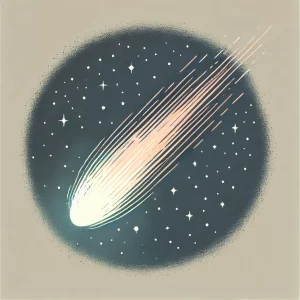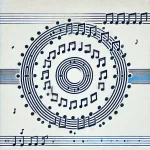天体観測 [Tentai Kansoku]
BUMP OF CHICKEN [Banpu Obu Chikin]
Words & Music : 藤原基央 [FUJIWARA Motoo]
Bump of Chicken is a four-member rock band formed in Chiba Prefecture wiki. The band’s name is said to mean “the weak’s counterattack.”
“Tentai Kansoku” was released as Bump of Chicken’s third single. It became their best-selling single and gained considerable popularity among the younger generation.
- 天体観測(てんたいかんそく) [tentai kansoku] : stargazing
午前二時 フミキリに
gozen niji fumikiri ni
望遠鏡を担いでった
bōenkyō o katsuide tta
ベルトに結んだラジオ
beruto ni musunda
雨は降らないらしい
ame wa furanai rashii
- 午前(ごぜん) [gozen] : A.M.
- 時(じ) [ji] : o’clock
- 踏切(ふみきり) [fumikiri] : railroad crossing
- 望遠鏡(ぼうえんきょう) [bōenkyō] : telescope
- 担ぐ(かつぐ) [katsugu] : carry
- ベルト [beruto] : belt
- 結ぶ(むすぶ) [musubu] : tie
- ラジオ [rajio] : radio
- 雨(あめ) [ame] : rain
- 降る(ふる) [furu] : fall
(translation) “At 2 a.m., I carried a telescope to the railroad crossing.
I tied a radio to my belt.
It doesn’t seem like it will rain.”
Is the place with the railroad crossing where they agreed to meet? It stirs up excitement before the adventure begins.
二分後に君が来た
nifun go ni kimi ga kita
大袈裟な荷物しょって来た
oogesa na nimotsu shotte kita
始めようか 天体観測
hajimeyou ka tentai kansoku
ほうき星を探して
hōkiboshi o sagashite
- 分(ふん) [fun] : minute
- 後(ご) [go] : after
- 君(きみ) [kimi] : you
- 来る(くる) [kuru] : come
- 大袈裟な(おおげさな) [oogesa na] : exaggerated
- 荷物(にもつ) [nimotsu] : luggage
- 背負う(しょおう) [shou] : carry on one’s back
- 始める(はじめる) [hajimeru] : begin
- ほうき星(ほうきぼし) [hōkiboshi] : comet
- 探す(さがす) [sagasu] : search
(translation) “Two minutes later, you arrived,
carrying exaggerated luggage.
Shall we begin? Let’s search for comets.”

深い闇に飲まれないように
fukai yami ni nomarenai yō ni
精一杯だった
seiippai datta
君の震える手を
kimi no furueru te o
握ろうとした あの日は
nigiro u to shita ano hi wa
- 深い(ふかい) [fukai] : deep
- 闇(やみ) [yami] : darkness
- 飲まれる(のまれる) [nomareru] : be swallowed
- 精一杯(せいいっぱい) [seiippai] : one’s best
- 震える(ふるえる) [furueru] : tremble
- 手(て) [te] : hand
- 握る(にぎる) [nigiru] : grasp
- あの [ano] : that
- 日(ひ) [hi] : day
(translation) “I tried my best not to be swallowed by the deep darkness.
I reached out to grasp your trembling hand.
On that day, “
見えないモノを見ようとして
mienai mono o miyou to shite
望遠鏡を覗き込んだ
bōenkyō o nozokikonda
静寂を切り裂いて
seijaku o kirisaite
いくつも声が生まれたよ
ikutsu mo koe ga umareta yo
- 見える(みえる) [mieru] : see
- もの [mono] : thing
- 見る(みる) [miru] : look
- 覗く(のぞく) [nozoku] : peek
- 静寂(せいじゃく) [seijaku] : silence
- 切り裂く(きりさく) [kirisaku] : tear apart
- いくつも [ikutsu mo] : many
- 声(こえ) [koe] : voice
- 生まれる(うまれる) [umareru] : be born
(translation) “Trying to see the unseen,
I peered through the telescope.
Voices were born, tearing through the silence.”

明日が僕らを呼んだって
ashita ga bokura o yonda tte
返事もろくにしなかった
henji mo roku ni shinakatta
「イマ」という ほうき星
ima to iu hōkiboshi
君と二人追いかけていた
kimi to futari oikakete ita
- 明日(あした) [ashita] : tomorrow
- 僕ら(ぼくら) [bokura] : us
- 呼ぶ(よぶ) [yobu] : call
- 返事(へんじ) [henji] : reply
- ろくに..ない [roku ni..nai] : barely
- する(する) [suru] : do
- 今(いま) [ima] : now
- 二人(ふたり) [futari] : two people
- 追いかける(おいかける) [oikakeru] : chase
(translation) “Even if tomorrow called us,
we barely replied.
We chased the comet called ‘Now,’ just the two of us.”
A poetic expression like “Tomorrow calls us” is used. Every time they find a star, they likely shout with excitement, becoming absorbed in stargazing until morning.
気が付けばいつだって
kigatsukeba itsudatte
ひたすら何か探している
hitasura nanika sagashite iru
幸せの定義とか
shiawase no teigi toka
哀しみの置き場とか
kanashimi no okiba toka
- 気が付く(きがつく) [kigatsuku] : notice
- いつだって [itsudatte] : always
- ひたすら [hitasura] : single-mindedly
- 何か(なにか) [nanika] : something
- 幸せ(しあわせ) [shiawase] : happiness
- 定義(ていぎ) [teigi] : definition
- 悲しみ(かなしみ) [kanashimi] : sadness
- 置き場(おきば) [okiba] : place to put something
(translation) “Whenever I notice,
I’m always searching for something,
like the definition of happiness or
the place to put sadness.”
生まれたら死ぬまで
umaretara shinu made
ずっと探している
zutto sagashite iru
さぁ 始めようか
sā hajimeyou ka
天体観測 ほうき星を探して
tentai kansoku hōkiboshi o sagashite
- 死ぬ(しぬ) [shinu] : die
- ずっと [zutto] : continuously
- さあ [sā] : come on
- 天体観測(てんたいかんそく) [tentai kansoku] : stargazing
- ほうき星(ほうきぼし) [hōkiboshi] : comet
- 探す(さがす) [sagasu] : search
(translation) “From birth to death,
I’m always searching.
Come on, let’s start
stargazing and search for comets.”
今まで見つけたモノは
ima made mitsuketa mono wa
全部覚えている
zenbu oboete iru
君の震える手を
kimi no furueru te o
握れなかった痛みも
nigirenakatta itami mo
- 今まで(いままで) [ima made] : until now
- 見つける(みつける) [mitsukeru] : find
- 全部(ぜんぶ) [zenbu] : everything
- 覚えている(おぼえている) [oboete iru] : remember
- 痛み(いたみ) [itami] : pain
(translation) “I remember everything I’ve found until now,
including the pain of not being able to grasp your trembling hand.”
There are variations of “見る / miru” (=see) such as “見える / mieru” (=be visible) and “見つける / mitsukeru” (=find). Since all of these appear in this song, it would be good to learn them together.
知らないモノを知ろうとして
shiranai mono o shirou to shite
望遠鏡を覗き込んだ
bōenkyō o nozokikonda
暗闇を照らす様な
kurayami o terasu yō na
微かな光 探したよ
kasukana hikari sagashita yo
そうして知った痛みを
sōshite shitta itami o
未だに僕は覚えている
imada ni boku wa oboete iru
「イマ」という ほうき星
ima to iu hōkiboshi
今も一人追いかけている
ima mo hitori oikakete iru
- 知る(しる) [shiru] : know
- 暗闇(くらやみ) [kurayami] : darkness
- 照らす(てらす) [terasu] : illuminate
- かすかな [kasukana] : faint
- 光(ひかり) [hikari] : light
- そうする [sōsuru] : do so
- 未だに(いまだに) [imada ni] : still
- 僕(ぼく) [boku] : I
- 一人(ひとり) [hitori] : alone
(translation) “Trying to know the unknown,
I peered through the telescope.
I searched for a faint light that would illuminate the darkness.
I still remember the pain I learned then.
I’m still chasing the comet called ‘Now’ alone.”
背が伸びるにつれて
se ga nobiru ni tsurete
伝えたい事も増えてった
tsutaetai koto mo fuetetta
宛名の無い手紙も
atena no nai tegami mo
崩れる程 重なった
kuzureru hodo kasanatta
- 背が伸びる(せがのびる) [se ga nobiru] : grow taller
- つれて [tsurete] : as
- 伝える(つたえる) [tsutaeru] : convey
- 事(こと) [ koto] : thing
- 増える(ふえる) [fueru] : increase
- 宛名(あてな) [atena] : addressee
- 無い(ない) [nai] : none
- 手紙(てがみ) [tegami] : letter
- 崩れる(くずれる) [kuzureru] : crumble
- 重なる(かさなる) [kasanaru] : pile up
(translation) “As I grew taller,
the things I wanted to convey also increased.
The letters without an addressee
piled up until they crumbled.”
Time has passed since that event, and perhaps the two have lost touch. The “letters without an addressee” likely symbolize unexpressed memories that have accumulated.
僕は元気でいるよ
boku wa genki de iru yo
心配事も少ないよ
shinpai goto mo sukunai yo
ただひとつ 今も思い出すよ
tada hitotsu ima mo omoidasu yo
- 元気(げんき) [genki] : healthy
- いる [iru] : be
- 心配事(しんぱいごと) [shinpai goto] : worries
- 少ない(すくない) [sukunai] : few
- ただ [tada] : just
- 一つ(ひとつ) [hitotsu] : one
- 思い出す(おもいだす) [omoidasu] : recall
(translation) “I’m doing well.
I don’t have many worries.
But there’s just one thing I still remember.”
予報外れの雨に打たれて
yohō hazure no ame ni utarete
泣きだしそうな
nakidashi sō na
君の震える手を
kimi no furueru te o
握れなかった あの日を
nigirenakatta ano hi o
- 予報(よほう) [yohō] : forecast
- 外れる(はずれる) [hazureru] : miss
- 雨に打たれる(あめにうたれる) [ame ni utareru] : be struck by rain
- 泣き出す(なきだす) [nakidasu] : start crying
(translation) “I was struck by unpredicted rain.
The day I couldn’t grasp your trembling hand as you were about to cry.”
見えてるモノを 見落として
mieteru mono o miotoshite
望遠鏡をまた担いで
bōenkyō o mata katsuide
静寂と暗闇の帰り道を
seijaku to kurayami no kaerimichi o
駆け抜けた
kakenuketa
そうして知った痛みが
sōshite shitta itami ga
未だに僕を支えている
imada ni boku o sasaete iru
「イマ」という ほうき星
ima to iu hōkiboshi
今も一人追いかけている
ima mo hitori oikakete iru
- 見落とす(みおとす) [miotosu] : overlook
- 駆け抜ける(かけぬける) [kakenukeru] : run through
- 支える(ささえる) [sasaeru] : support
(translation) “I overlooked what was visible
and carried the telescope again.
I ran through the silent and dark path home.
The pain I learned from
that still supports me.
I’m still chasing the comet called ‘Now’ alone.”
Not being able to grasp the hand that was right in front of them.

もう一度君に会おうとして
mō ichido kimi ni aō to shite
望遠鏡をまた担いで
bōenkyō o mata katsuide
前と同じ 午前二時
mae to onaji gozen niji
フミキリまで駆けてくよ
fumikiri made kakete ku yo
始めようか 天体観測
hajimeyou ka tentai kansoku
二分後に君が来なくとも
nifun go ni kimi ga konaku to mo
「イマ」という ほうき星
ima to iu hōkiboshi
君と二人追いかけている
kimi to futari oikakete iru
- もう一度(もういちど) [mō ichido] : once again
- 会う(あう) [au] : meet
(translation) “Once again, I tried to meet you,
carrying the telescope again,
and at the same 2 a.m. as before,
I ran to the railroad crossing.
Shall we begin stargazing?
Even if you don’t come two minutes later,
I’m still chasing the comet called ‘Now’ with you.”
Did they eventually reunite? It seems like they are chasing it together.
The song beautifully captures the spirit of youthful adventure and the tender experiences of first love through stargazing. These are fond memories. In Japanese, this kind of nostalgic sentiment is often expressed with the word “青春 / seishun”.
The song became so popular that it even inspired a TV drama titled “Tentai Kansoku” the following year.
Thanks for reading! Feel free to comment if you have any feedback or questions.
Follow me on X.



